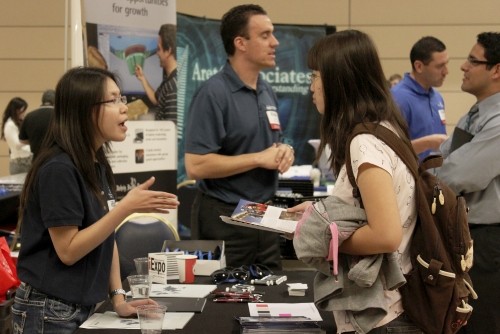When it comes to job skills, 87 percent of students say they have what it takes to start working- but only about 50 percent of managers agree.
UA’s Office of Student Engagement aims to change that.
Their latest pilot program, “Build the Skill: Collaboration,” will educate students on the art of collaboration. This eight-week workshop includes mock interviews, online work and built-in time for students to practice the skill.
Jessica Litvack, senior coordinator of student engagement and faculty programs, said this is part of a nation-wide pilot program initiated by Education Design Lab.
“Education Design Lab had this brainchild—they wanted to work with institutions throughout the country to build new ways to teach these skills,” Litvack said. “They selected a few different institutions—Vassar, Georgetown, some others—and then each school got a skill. We chose collaboration.”
RELATED: Students explore Objectivism with STRIVE club
All of the participating schools are testing different methods, and will then collaborate with eachother to refine the program as a whole.
“What’s really great is each school has taken a different approach to teaching, and we’re all sharing the information and the curriculum, so we can implement the other programs as well,” Litvack said. “We share the successes and the failures with each other.”
Sarah Seavey, career educator and coordinator for internship and early career readiness at UA, said while collaboration and leadership are very important skills, most students don’t know precisely what employers mean when they ask for them.
“A lot of students will say they have leadership skills on a resume, but when asked to give an example of a time they displayed leadership, will talk about how during a group project, someone wasn’t doing their work so they stepped up and did it for them,” Seavey said. “That’s not what employers are looking for in a collaborative role.”
In a corporate environment, it’s not efficient for one employee to spend their time doing everyone else’s work, Seavey said. That’s where students’ misconceptions about what exactly leadership and collaboration entail present themselves.
“What they’re looking for is the kind of leadership when you sit that person down and talk,” Seavey said. “You ask if anything is wrong, because they’ve been missing deadlines. It’s that collaborative mind frame they want, not a leader leading out front, or doing most of the work.”
Another misconception among students, according to Seavey, is that they can simply say they have the skills on their resume.
“When you write on your resume a bullet point, ‘I’m a good collaborator,’ what does that mean? You need concrete examples,” Seavey said. “They can be from everyday life, class, your roommates. It’s not that students don’t have the skills, they don’t know how articulate them.”
Students who participate in the “Build the Skill: Collaboration” workshop will not only learn how to provide those concrete examples, but will also earn a UA-branded digital badge for their LinkedIn profile.
Pete Corrigan, assistant director of employer relations at UA, said these badges are important because they help distinguish students.
RELATED: Four ways for undergrads to get involved in science research
“Everything is so competitive, you need to be able to distinguish yourself,” Corrigan said. “The long term goal for this is to designate it—like the 100% Engagement Initiative—on students’ transcripts.”
While not all employers might be familiar with the badge, Seavey maintained that it’s still a good thing to have.
“UA has the prestige behind it, with our research and our faculty, to build the trust for the badging,” Seavey said. “When an institution like UA puts the time and resources into a program like badging, employers will trust it, even if they don’t really understand what it is or why the badges were given.”
Litvack said there’s another reason for the badging.
“While we’re looking to award and recognize students for the skills they have, we’re also trying to interest them in learning more skills,” Litvack said. “Building these skills is additional work, on top of classes and five jobs and the million clubs most students are part of.”
Many workshop elements will be run from D2L, for the convenience of the students, Litvack said. Students will choose four of the six modules available, which each focus on a particular collaboration skill, completing one per week. Each module will take around an hour to complete, and allow students to hone in on the building blocks they need the most.
The process starts with a launch day and a launch assessment, which includes a self-evaluation, peer evaluation and professor evaluation. These combined provide students with a baseline from which to judge their problem areas, and subsequently measure their growth.
Following completion of D2L work comes a simulation day on April 15, Litvack said.
“Simulation day is when we’ll bring all the students onto campus, to work with others in the cohort for a half day on resolving a complex problem,” Litvack said.
The deadline to apply for the workshop is March 6th, and the application can be found online. All that’s required is that students be currently engaged in a collaborative group project . The workshop is free to students.
Follow Marissa Heffernan on Twitter.









